- Home
- Georgette Heyer
The Foundling Page 13
The Foundling Read online
Page 13
‘No,’ muttered the boy. He added grudgingly: ‘Sir.’
‘Then I think I had better drive you to the inn where I am putting up, and see what can be done for that black eye of yours. What is your name?’
The boy gave another sniff. ‘Tom,’ he divulged reluctantly. ‘I want to go to London. And I would have gone, too, only that I asked those men the way to Baldock, and they said they would put me on the road, and then – and then –’ He ground his teeth audibly, and said in a kind of growl: ‘I suppose I was a regular green one, but how was I to tell – ?’
‘No, indeed, it is the kind of thing that might happen to anyone,’ the Duke agreed, propelling him gently towards the gig. ‘Up you get!’
‘And I landed one of them a couple of wisty castors!’ Tom told him, allowing himself to be helped into the gig. ‘Only they had cudgels, and that is how it came about. And they took my five pounds, and my watch, which Pa gave me, and when I came to myself they were gone. I don’t care for having my canister milled, but it is too bad to have taken all my money, and if I could catch them Pa would have them transported!’
The Duke, having put him safely into his seat, went to the cob’s head, and began to turn the gig in the narrow space available for the manœuvre. He was not at all inclined to take his youthful protégé to an inn of such apparent ill-fame as the Bird in Hand, even though it seemed highly probable that Tom might there realise his wish of catching his assailants; and he decided that his business with Mr Liversedge would have to be postponed until the next day. Having turned the gig, he mounted on to the box seat, gathered up the reins, and gave the cob the office to trot homewards. Tom sat slumped on the seat beside him, sunk in depression, sniffing at intervals, and wiping his nose with a grubby handkerchief. After an interval, he said with would-be civility: ‘I don’t know why you should put yourself to this trouble, sir. I am sure you need not. I daresay I shall do very well when my head stops aching.’
‘Oh, you will be as right as a trivet!’ Gilly said. ‘Had you a bag with you, and did the thieves steal that as well?’
Tom fidgeted rather uncomfortably. ‘No. That is – Well, the thing is I couldn’t bring my portmanteau, sir, because – Well, I couldn’t bring it! But then, you know, I had my money, and I thought I could buy anything I might need.’
The Duke, feeling that he had much in common with his young friend, nodded understandingly, and said that it did not signify. ‘I expect one of my nightshirts will not fit you so very ill. How old are you?’
‘Fifteen,’ replied Tom, a hint of challenge in his voice.
‘You are very big! I had thought you older.’
‘Well, I do think anyone might suppose me to be seventeen at least, don’t you?’ Tom said, responding to this gratifying remark, and speaking in a far less belligerent tone. ‘And I am very well able to take care of myself – in general. But if sneaks set upon one two to one there is no doing anything! And I shall never have such a chance again, because they will watch me so close – Oh, it is too bad, sir! I wish I was dead! They would have been sorry then! At least, Pa would, but I daresay Mr Snape wouldn’t have cared a button, for he’s the greatest beast in nature, and I hate him!’
‘Your schoolmaster?’ hazarded the Duke.
‘Yes. At least, he is my tutor, because Pa wouldn’t have me go to school, which I had liefer have done, I can tell you! And when it came to his reading to me in the chaise, not even something jolly, like Waverley, or the Adventures of Johnny Newcome, which is a famous book, only of course he took it away from me – he would! – but the horridest stuff about Europe in the Middle Ages! As though anyone could listen to such dry fustian! And in the chaise, sir! There was no bearing it any longer!’
‘It was certainly very bad!’ agreed the Duke sympathetically. ‘But they will all do it! I remember my own tutor once tried to interest me in Paley’s Natural Theology upon one of our journeys from Bath to S – to my home!’ he corrected himself swiftly.
‘That sounds as though it would be just as dry!’ said Tom, impressed.
‘Oh, worse!’
‘What did you do, sir?’
The Duke smiled. ‘I was very poor-spirited: I tried to listen.’
‘Well, I hit Mr Snape on the head, and ran away!’ said Tom, with a return to his challenging manner.
The Duke broke into his low laugh. ‘Oh, no, did you? But how did you contrive to do that when you were driving along in a chaise?’
‘I couldn’t, of course, but the thing is we changed horses at Shefford, and then when we had not gone a mile out of the town the perch broke, and we were obliged to stop. And the postilion was to ride back to Shefford to procure another chaise for us, and when he was gone old Snape said we would take a walk in the wood, and that would not have been so bad, but what must he do but pull his stupid book out of his pocket again, just when I had seen a squirrel’s drey – at least, I am pretty sure it was one, and I would have found out if he had but let me alone! But he is such a prosing, boring beast he don’t care for anything worth a fig, and he said he would read another chapter, and so I floored him. I have a very handy bunch of fives, you know,’ he said, exhibiting his large fist to the Duke, ‘and I dropped him with a flush hit just behind his ear. And if you are thinking, sir,’ he added bitterly, ‘that it wasn’t a handsome thing to do, to hit him from behind, I can tell you that I owe him something, for he is a famous flogger, and is for ever laying into me. Did your tutor too?’
‘No, very seldom,’ replied the Duke. ‘But he was a great bore! I fear I could never have floored him, for I was not a big fellow, like you, but I own I never thought of doing so. Did you knock him out?’
‘Oh, yes!’ said Tom cheerfully. ‘I don’t think he is dead, though. I could not wait to see, of course, but I should not think he could be. And in a way it will be as well if he is not, because they would hang me for it, wouldn’t they?’
‘Oh, I don’t suppose it is as bad as that!’ Gilly consoled him. ‘Did you then make your way from Shefford?’
‘Yes, and the best of it is he will not know which way I went, and I kept to the woods, and the fields, so all the chaises in the world won’t help him. I thought I would get on the coach for London, and see all the sights there, which he would not let me do, horrid old addle-plot! Only fancy, sir! We drove up from Worthing, and we spent just one night in London, and the only thing he would let me see was St. Paul’s Cathedral! As though I cared for that! Not even the wild beasts at the Exeter Exchange! Of course I knew he would never take me to a theatre, and it was no use trying to give him the bag then, for someone would have been bound to have seen me. But when the perch broke, and such a chance offered, I do think I should have been a regular clodpole not to have seized it! And now – and now I haven’t a meg, and it is all for nothing! But one thing is sure! – I won’t go tamely home! If I can’t get to London, but very likely I shall think of a way to do so, I shall make for the coast and sign on a barque as ship’s boy. If there had been any pirates left I should have done that rather even than have gone to London. Though I would like to see the sights, and kick up some larks,’ he added wistfully.
‘Don’t despair!’ said Gilly, much entertained by this ingenuous history. ‘Perhaps we can contrive that you shall go there.’
An eager face was turned towards him. ‘Oh, sir, do you think I might indeed? But how?’
‘Well, we will think about that presently,’ promised the Duke, emerging from the lane on to the Hitchin road. ‘First, however, we must lay a piece of steak to that eye of yours.’
‘Sir, you are a regular Trojan!’ Tom said, in a rush of gratitude. ‘I beg your pardon for not being civil to you at first! I thought you was bound to be like all the rest, jawing and moralising, but I see you are a bang-up person, and I do not at all mind telling you what my name is! It’s Mamble, Thomas Mamble. Pa is an ironmaster, and we
live just outside Kettering. Where do you live, sir?’
‘Sometimes in the country, sometimes in London.’
‘I wish we did so!’ Tom said enviously. ‘I have never been south of Kettering until they sent me to Worthing. I had the measles, you know, and the doctor said I should go there. I wish it had been Brighton! That would have been something like! Only not with old Snape. You can have no notion what it is like, sir, being Pa’s only son! They will not leave me alone for a minute, nor let me do the least thing I like, and everything is wretched beyond bearing!’
‘But I know exactly what it is like,’ Gilly said. ‘If I did not, I suppose I should have been just like all the rest, and should have handed you back to your tutor.’
‘You will not!’ Tom cried, in swift alarm.
Gilly smiled at him. ‘No, not quite immediately! But I think you must go back to your father in the end, you know. I daresay he is very much attached to you, and you will not like to cause him too much anxiety.’
‘N-no,’ agreed Tom, rather grudgingly. ‘Of course I shall have to return, but I won’t do so until I have been to London! That would be worth anything! He will be in one of his grand fusses, I suppose, and I shall catch it when I do go back, but –’
‘You might not,’ the Duke said.
‘You do not know Pa, sir!’ replied Tom feelingly. ‘Or Snape!’
‘Very true, but it is possible that if he knows you have been my guest, and if I meet your papa, and talk to him, he may not, after all, be so very angry with you.’
Tom surveyed him doubtfully. ‘Well, I think he will be,’ he said. ‘I don’t care, mind you, for I can stand a lick or two, but Pa is the biggest ironmaster in all our set, and as rich as – as Crassus, and he has the deuce of a temper! And he is for ever wanting to bring me up a gentleman, and he won’t have me do anything vulgar and jolly, or know the out-and-out fellows in Kettering, and he is bound to be in a rage over this!’
‘Well, that would be very terrible,’ said the Duke, in his tranquil way. ‘Perhaps you had best return to Mr Snape after all.’
‘No, that I won’t do!’ declared Tom, with great resolution.
It was not long after this that they reached Baldock, and drove into the yard of the White Horse. Tom, although much revived in spirit, was physically a good deal shaken still, and was glad of the support of the Duke’s arm into the inn. The waiter, whom they encountered in the lobby at the back of the house, stared at them in gloomy surprise, but the Duke paid no attention to this, merely saying: ‘Desire Mrs Appleby to step up to my room, please,’ and leading Tom to the staircase.
When Mrs Appleby came sailing into the Pink Parlour a few minutes later, she was not only very curious, but more than half inclined to take exception to Tom’s arrival. The waiter had described his appearance in unflattering terms, and although she had been prompt to snub him, she had been equally prompt to come up and inspect Tom for herself.
She found him sitting in the armchair by the fire, while the Duke bathed his bruised head and face. He certainly looked a disreputable object, and Mrs Appleby exclaimed in a displeased voice: ‘Well! And may I ask, sir, what is this?’
The Duke was quite unused to being spoken to in that tone, and he turned his head to look at her in some surprise. Without knowing why she did so, she dropped a slight curtsy, and said very much more mildly: ‘I understood as you wanted to speak to me, sir.’
‘Yes,’ the Duke replied. ‘I want a bedchamber to be prepared for my young friend, if you please. He has had the misfortune to be robbed by a couple of footpads. Sit still, Tom, and hold that wet pad to your eye: Mrs Appleby will bring you some raw beef to put upon it directly.’
‘I didn’t know you was going to bring any young gentleman back with you, sir, I’m sure.’
‘No, indeed, how should you?’ said the Duke. ‘I did not know it myself. Have you some objection?’
‘Oh, of course, sir, if he is a friend of yours – ! Only it seems a queer thing, with you not mentioning it, and him with no baggage, and all!’
‘It is a sad fix for him to be in,’ agreed the Duke. He smiled at her. ‘We must do what we can to make him more comfortable.’
‘Yes, sir,’ said Mrs Appleby helplessly. ‘I’m sure I would not wish to be unfeeling, but I never heard of a young gentleman trapesing about the country, and no carriage, nor nothing, and seemingly quite by himself!’
‘No, it was certainly unwise, but he will know better another time. I expect he would be glad of that hot-brick you brought up for me.’
At this, Tom uttered a growling protest, which had the effect of drawing Mrs Appleby’s attention to him. She now perceived that he was younger than she had at first supposed, and was looking extremely wan and battered. Her face softened; she said: ‘I will see to it, sir. Oh, dearie me, and the way his good clothes are spoilt! I do hope he has not run away from school!’
‘No, I have not!’ Tom said.
She shook her head, but said: ‘Do you take him to No. 6, sir: you will find the bed is ready made up. And if he will take off his jacket and his nether-garments I will see what can be done to furbish them up.’
She bustled away, and Tom, asserting that he was quite well, and did not wish to go to bed, allowed himself to be led down the passage to a small room at the back of the house. When upon his feet he was obliged to confess that he still felt as sick as a horse. The Duke said that he would feel very much better when he had swallowed a glass of hartshorn and water, and rested for a little while, and helped him to strip off his mired clothing. Tom then lay down upon the bed in his underlinen, and the Duke covered him with the patchwork quilt.
‘I did not think it would be bellows to mend with me so easily!’ Tom murmured discontentedly. ‘But he hit me with a cudgel, after all! I am as dead as a herring! I only hope old Snape is feeling half as bad!’
He closed his eyes on this pious aspiration; and the Duke, wondering a little ruefully into what difficulties his sympathy with a fellow-sufferer might lead him, went away to ask Mrs Appleby for some hartshorn.
Ten
The Duke did not borrow Mrs Appleby’s gig again until the following afternoon, for the morning was fully taken up with purchasing such articles of apparel and toilet as he considered necessary for his protégé’s comfort and respectability. His notions did not always jump with Tom’s, since he laid what that young gentleman considered to be undue stress on the indispensability of soap and tooth-powder, and other such frivolous luxuries. Nor did Tom perceive the necessity of carrying with him on his travels more than one shirt. But the Duke was firm on these points, and after dealing patiently with a sudden and alarming fit of independence in young Mr Mamble, in which he was informed that Pa would not like his son and heir to be beholden to anyone, he led him forth on a tour of the Baldock shops, assuring him that he would keep faithful tally of his expenditure, and present Pa with his bill in due course.
Mr Mamble, whose resilient constitution Gilly could not but envy, had very soon recovered from his malaise, and had got up from his bed on the previous evening in time to work his way steadily through two glazed veal olives, a collop of beef, part of a leg of pork, two helpings of ratafie pudding, and a jelly. He told Gilly, after this repast, that he was now in bang-up form; and after selecting two apples from a dish on the side-table, which he set aside to be consumed when pangs of hunger should attack him later in the evening, he settled down before the fire, and poured forth a jumbled history of his life and its trials to his sympathetic host.
From this recital Gilly gathered that his mother had died when he was still in short-coats, and that his remaining parent, who seemed to have prospered exceedingly in his business, had set his heart and his considerable energy on to the task of turning his heir into an out-and-out gentleman. To this end he had engaged Mr Snape, whose unenviable duty it was to instruct Tom in every branch
of a gentleman’s education, to keep him out of mischief and low company, and to guard him from the chances of chills or infection. Mr Snape appeared to be a joyless individual, whom the Duke found no difficulty at all in disliking. He very soon perceived that Tom’s lot was worse than his own had been, for whereas Lord Lionel was naturally untroubled by considerations of gentility, and had been quite as determined that his nephew should learn to clean his own guns, saddle and bridle his horses (and even shoe them), carve joints, and protect himself with his fists, as that he should acquire a proper knowledge of the Humanities, Mr Mamble was morbidly anxious that Tom should engage on no occupation which might lead supercilious persons to suppose that he was not born into the haut ton. Consequently, poor Tom, himself unaffected by social ambitions, had been fenced in on all sides, his natural bents frowned upon, and his overflowing spirits curbed. The Duke, listening to him, felt real pity stir his heart, and thought that if he could lighten the lot of this oddly likeable boy he would have performed the first meritorious action of his life. Whatever the outcome of his interview with Mr Liversedge, he would, he supposed, be journeying back to London within two days. If the zealous Mr Snape had not by that time tracked his pupil down, he would take him to London, and from Sale House write a letter to Mr Mamble, informing him that, having picked Tom up on the road, he had carried him to town, and would render him up to his parent whenever that busy gentleman could spare the time to visit the Metropolis. The Duke knew the world well enough to be sure that the knowledge that his son had fallen into noble company would suffice to allay Mr Mamble’s wrath; and he had little doubt that if he chose to put himself to the trouble of doing it he could persuade Mr Mamble to dismiss Mr Snape, and send his son to school. If, on the other hand, Mr Snape arrived in Baldock before he had left for London, the Duke, who had never made the least push to deal with his own tutor, anticipated no difficulty in dealing with Tom’s. As for the desirability of setting an anxious parent’s mind at rest without loss of time, he dismissed this without compunction. It would ill become him, he thought, to waste any consideration on Tom’s father when he had none for his own far more estimable uncle. If Lord Lionel stood in need of a lesson, so, in greater measure, did Mr Mamble, and he should have it. Meanwhile, he would keep Tom safely out of harm’s way – and heaven alone knew what harm Tom would plunge into if allowed to wander about the countryside alone! – and gratify his longing to see all the sights of London.

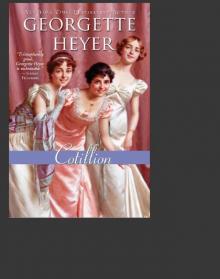 Cotillion
Cotillion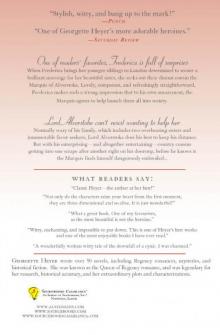 Frederica
Frederica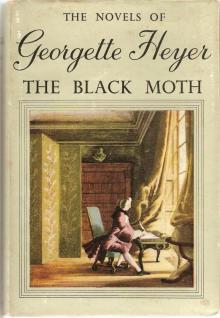 The Black Moth: A Romance of the XVIIIth Century
The Black Moth: A Romance of the XVIIIth Century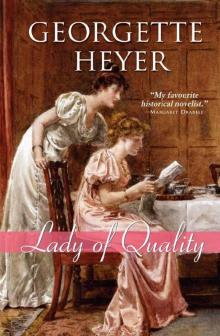 Lady of Quality
Lady of Quality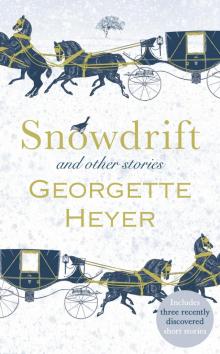 Snowdrift and Other Stories
Snowdrift and Other Stories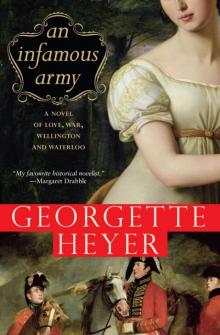 An Infamous Army
An Infamous Army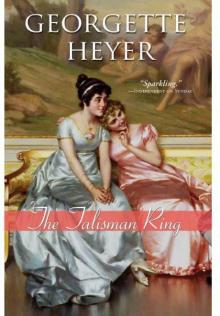 The Talisman Ring
The Talisman Ring Venetia
Venetia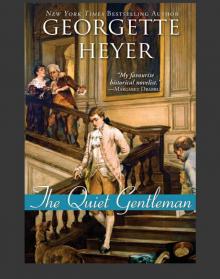 The Quiet Gentleman
The Quiet Gentleman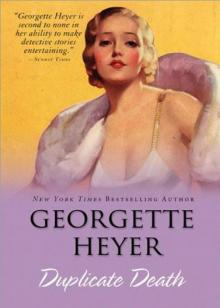 Duplicate Death
Duplicate Death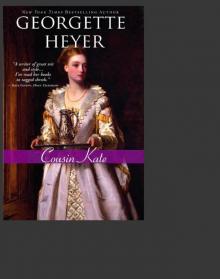 Cousin Kate
Cousin Kate Black Sheep
Black Sheep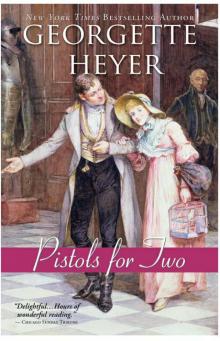 Pistols for Two
Pistols for Two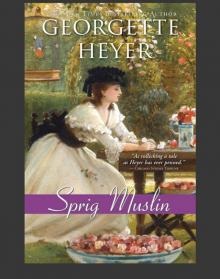 Sprig Muslin
Sprig Muslin No Wind of Blame
No Wind of Blame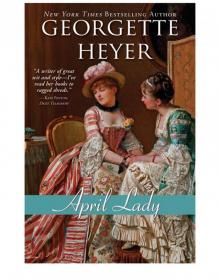 April Lady
April Lady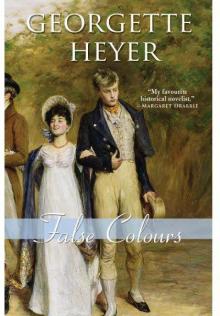 False Colours
False Colours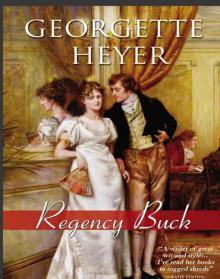 Regency Buck
Regency Buck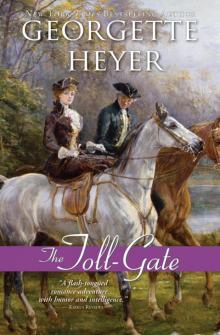 The Toll-Gate
The Toll-Gate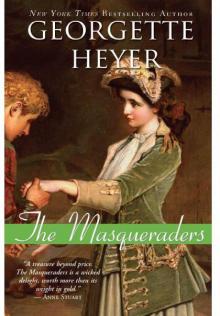 The Masqueraders
The Masqueraders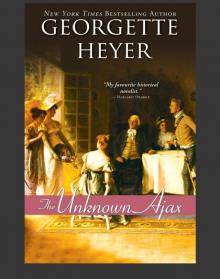 The Unknown Ajax
The Unknown Ajax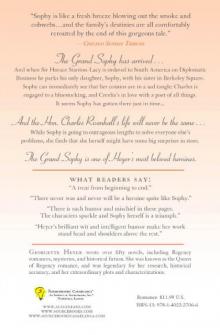 The Grand Sophy
The Grand Sophy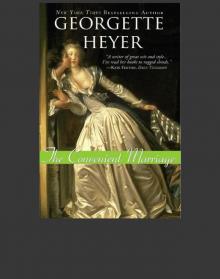 The Convenient Marriage
The Convenient Marriage Faro's Daughter
Faro's Daughter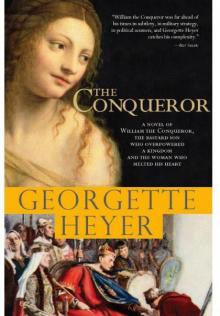 The Conqueror
The Conqueror The Foundling
The Foundling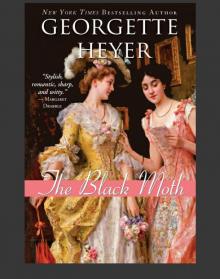 The Black Moth
The Black Moth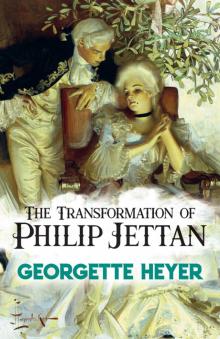 The Transformation of Philip Jettan
The Transformation of Philip Jettan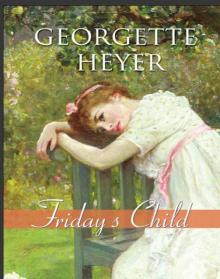 Friday's Child
Friday's Child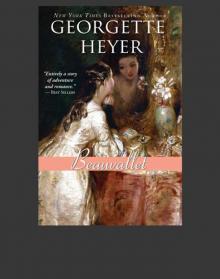 Beauvallet
Beauvallet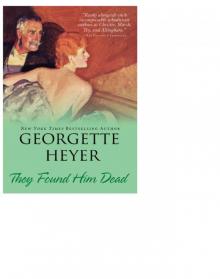 They Found Him Dead
They Found Him Dead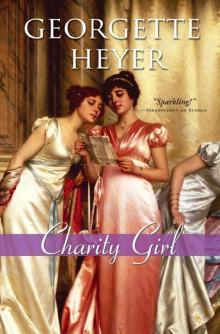 Charity Girl
Charity Girl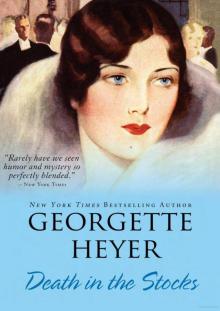 Death in the Stocks: Merely Murder
Death in the Stocks: Merely Murder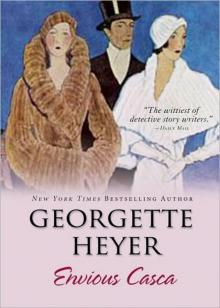 Envious Casca
Envious Casca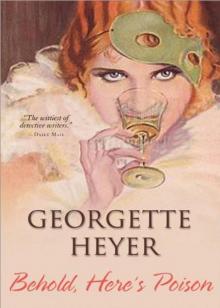 Behold, Here's Poison
Behold, Here's Poison Arabella
Arabella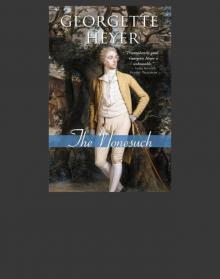 The Nonesuch
The Nonesuch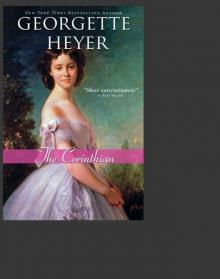 The Corinthian
The Corinthian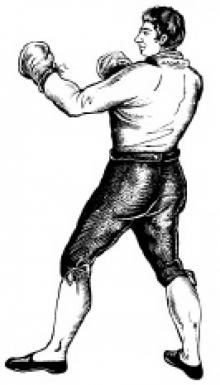 Jennifer Kloester
Jennifer Kloester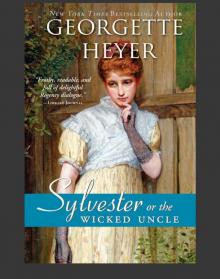 Sylvester
Sylvester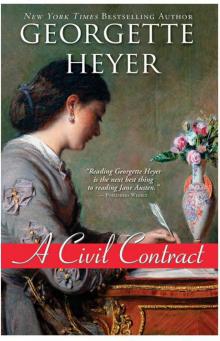 A Civil Contract
A Civil Contract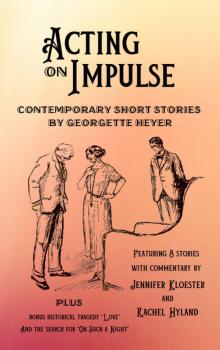 Acting on Impulse
Acting on Impulse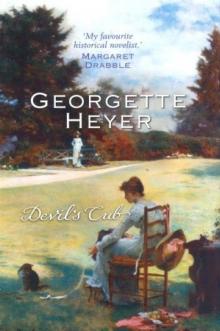 Devil’s Cub at-2
Devil’s Cub at-2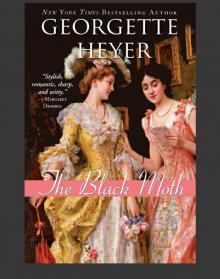 Black Moth
Black Moth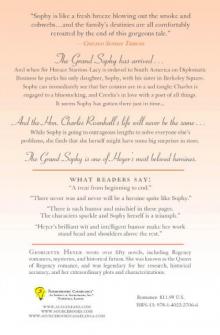 Grand Sophy
Grand Sophy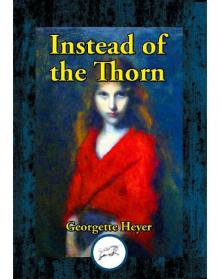 Instead of the Thorn
Instead of the Thorn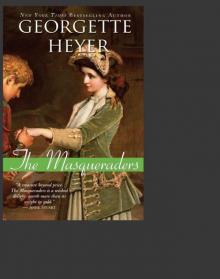 Masqueraders
Masqueraders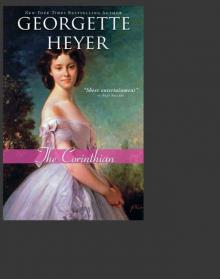 Corinthian
Corinthian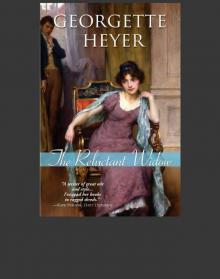 Reluctant Widow
Reluctant Widow